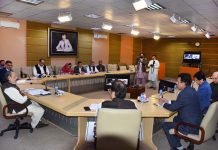
ISLAMABAD, Jan 26 (APP): Speakers of a webinar unanimously urged India, in its own interest, to introduce inclusive economic and political policies to counter the mindset of religious extremism which has already penetrated into its state institutions.
The webinar titled ‘India under the Shadow of RSS’ organized by the Institute of Regional Studies (IRS) Wednesday was participated by some of the most highly qualified Pakistani academicians, teaching at Quaid-e-Azam University (QAU), one of the most prestigious public sector universities, who expressed their views on the subject.
Dr.Ilhan Niaz, Assistant Professor, Department of History, QAU, took a long term and historical perspective to explain the culture of power in south Asia in general while particularly focusing on Indian and Pakistani contexts with reference to communal politics espoused by both these countries. He also explained the historical roots and nature of the majoritarian impulse of the modern Indian state.
“Domestic politics of any big country has international ramifications. Rather than learning from Pakistan, India is becoming a communal state itself. Partly because of smugness I would say.The intention behind Pakistan was not to create a majoritarian communal state and the emergence in India of a new form of thinking is indeed dangerous and we should empathize with them,” said Dr. Niaz.
Since the end of Gupta and Mauryian Empires, he said, no Hindu ruler has ruled India.“India has been subjected to subjugation by Afghans, Turks, Persians, Mongols and lately the Britain. This is a historical grievance and a cause of desire to reclaim and to see India on the world stage. Hindu nationalist discourse is based on 1200 years of subjugation. The Hindu cultural and political project aims at regaining lost dignity. Muslim minority in India is a demographic residue of a millennium of imperial rule,” he added delving deep on the psycho-social nature of extremist mindset in India.
He said that the nature of Indian fascism is different from European fascisms of 1920s and 30s, for example that of Mussolini and Hitler. In the Indian case it has slowly captured the base, loyalty of the sizeable number of Indian electorate. In his view, it is a gradualist project seeking to revive its cultural and political DNA.
Dr. Niaz concluded by saying that it all has serious strategic, military, and economic implications for Pakistan. “I think, from Pakistan’s perspective we need to understand what’s happening in India and what’s happening in our country. How are we treating our own minorities? This question is equally important. We need to improve human rights situation in our own country. I think Pakistan needs to step up and offer itself as a credible, alternative model of south Asian modernity,” he argued.
In response to a question regarding the longevity of Hindutva ideology’s shelf life and about the role of liberal opposition Dr. Salma Malik, Assistant Professor, Department of Defence and Strategic Studies, QAU, said that Hindutva ideology has 20 to 25 percent electoral base.“When you concede the space to ideologues then definitely they will claim the space. Pakistan has also gone through ideological politics. The clergy in south Asia has a certain kind of appeal. Congress on the other hand has become a dynastic party which is run by Gandhi and Nehru families. This is unfortunate in south Asia.
Secondly, secular leadership has not been able to introduce economic reform plans and policies. As a result the conservative mindset has become institutionalized where it is making its way into state institutions which is very unfortunate. Similarly, we have Trump mindset in US. We need to ask the question what went wrong with the project democracy”, she said concluding her arguments against the rising tide of religious extremism across the world.
Answering a question from the moderator about the comparative situations regarding minorities in both countries Dr. Ilhan said: “It depends on the indicator you choose. We hear reports of Hindu girls being raped and cases of forced conversions. With the rise of Tehrik-e-Labbaik Pakistan it is likely to become more dangerous.
“Our own tragic trajectory of violence against minorities and heightened sectarian conflict is a matter of grave concern and we need to focus on it first. The current times require us to be honest in any case.”
Dr.Salma Malik, Assistant Professor, Department of Defence and Strategic Studies, QAU and Dr.Ilhan Niaz, Assistant Professor, Department of History, QAU, spoke on the occasion while Aarish Khan from the IRS moderated the discussion.